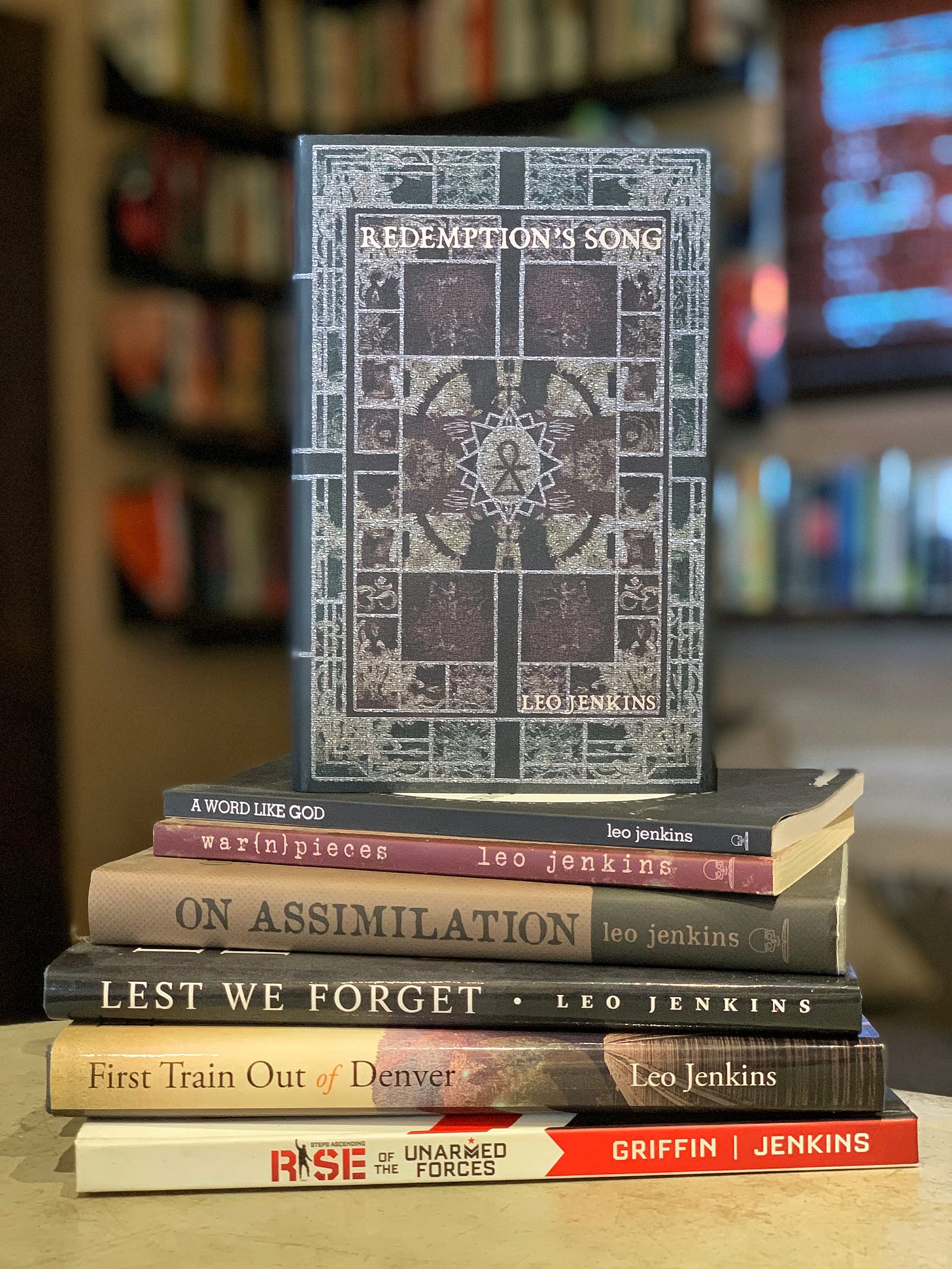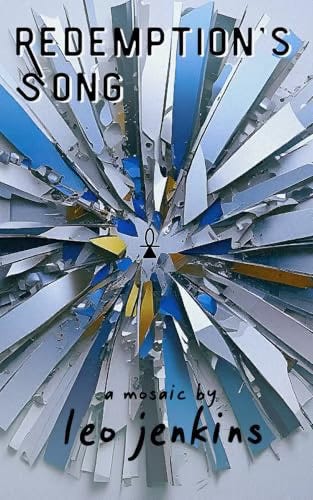12 Questions for a Writer: Leo Jenkins
Leo Jenkins is a writer, poet, adventurer, athlete, and veteran. The author of nine books, his latest effort is "Redemption's Song". We talked about that and a host of other things.
1. I’ve been following your efforts since at least 2013, but tell our readers who are you, what you have written, and why.
In sixth grade I came in third place in a junior high poetry contest. My poem was about freedom. It was the only award my writing has ever received.
I’ve been busy since sixth grade. I went to a couple of wars. I traveled the world. I wrote 8 or 9 books. I met a woman in Mexico. We drove to Panama together where I was stabbed to death on the edge of the jungle, then I wrote a book about that too.
My interests include pizza and overthinking things to death
2. What is it that draws you to writing?
It was Kafka who said, “A non-writing writer is a monster courting insanity.” Franz was without error. I write for my sanity and for the welfare of those around me.
3. What are the hardest and best things about making a life as a writer?
The hardest part about being a writer, not a person who writes, a writer, is the moments when you feel compelled to write, when the Voice is humming inside of you, begging, pleading to run free and your hands are occupied by a task not fit for their existence. That and marketing, marketing is the worst.
I’m not sure what the best thing is about being a writer, though it is nice that I’ve never been reprimanded for showing up to work late, drunk, and in my pajamas. That is nice.
4. What do you want people to take away from this book?
A person can only take away from a book what they bring to the book. The greatest works are only mirrors which display the reader’s depth.
5. What advice do you have for aspiring authors/editors?
If the money matters, your writing probably won't, and vice versa.
Seek criticism. Avoid praise. Be consistent. But most importantly, be fucking consistent.
6. What is your favorite book and why?
The Bhagavad Gita.
I read this book for the first time shortly after returning from Iraq in 2006. On the precipice of battle, the moral dilemma faced by Arjuna felt particularly salient. I’ve since read it a few more times, along with the entire Mahabharata (in which the Gita is contained).
The Brothers Karamazov is a close second.
7. Which writers do you consider inspirations and why?
It’s no secret that I admire Cormac McCarthy. Just the fact that he was able to write what he wanted, never tour, never do any marketing, and still left his mark on literature, that is a huge accomplishment. He didn’t even show up to receive his Pulitzer for The Road. What a legend.
Other writers I appreciate: David Rose, John Coetzee, Olga Tokarczuk, Mary Oliver, Murakami, Dostoyevsky, Vonnegut, Kerouac, Steinbeck, Didion. I think I like Bukowski at times, and at others I’m not so sure.
8. Tell us about the process you undertook to write Redemption’s Song and explain the title. I saw Bob Marley references throughout but what does the title mean in standing for the work?
There is a trail of breadcrumbs throughout Redemption’s Song. They are everywhere and they lead to the book’s theme. Things like the epilogue coming in the beginning of the book (an epilogue comes at the end of the story). Things like the question on the back cover, “What is a good life?” Which is answered in the epilogue, by a person who had to go through a significant shift in their outlook in order to finally understand what is worth living for.
The lyric by Marley at the beginning of the book also points directly to this. The book’s title track reinforces the theme. Then in the story, A Child’s First Blanket, we see the relevant pieces come together.
9. What did you learn in the process of writing Redemption’s Song, both substantively and personally, and what surprised you?
I’ll tell you what really surprised me, if I’m being honest, is how few people bought it. After nine books, it’s up there as some of my best writing. But again, if I’m being honest, it’s a bit illusive and I suppose most people wait to read a book until other people have told them it is good. That’s why books always have all the third-party validation smeared over their covers like sleazy eyeshadow and rouge. Alas, marketing.
10. You call this book “a mosaic”. What does that mean?
Redemption’s Song is in itself an image arranged from the parts of multiple stories. It exists and can be viewed as its individual pieces, but also can be seen as the whole of what those pieces create when assembled in a particular order or shape. So depending on how you look at it, it can be a novel or a collection of short stories, but really it is a novel made of short stories, the way a mosaic is an image made of smaller pieces. I’m not sure if I am explaining that very clearly.
The other significance of the use of the word mosaic is a poem I wrote for a book called, A Word Like God. That poem, “Mosaic” and where it is placed in the context of the book in which it appears, alludes to an underlying theme of Redemption’s Song.
11. Some of the stories in Redemption’s Song connected particularly deeply with me, particularly Wild Thing, Tom Smith Journal Entry One, and Gloves of Eden. I’m not particularly mystified by that. I am a soon-to-be 52-year-old guy looking back at living some fractious decades. I suspect we share some of the same retrospective tendencies. Could you address the notion of trying to figure out who you are and what really matters to you? I certainly feel like that’s a theme throughout this book. Or tell me I’m way off base and what I should have gotten from it.
I am going to answer your question with a question. Did you notice the names of the characters? There were really only three characters in this book, and if we were to boil them down, there is really only one person who is divided into three different character experiences. The everyman. Tom. Dick. Harry.
For whatever reason there are not many books being published in contemporary literature that reflect a deep notion of our experience, yours and mine. When writing this I thought a lot about guys like Tyler Carroll; a father of four, a firefighter, a small business owner. I thought about how much a guy like that carries for those he loves. At the risk of sounding cynical, it has upset me to see men who have given so much over a lifetime of service to others being trivialized, being made the villain (or at best the buffoon) of modern storytelling. I don’t like to think of this book as being a reaction to that, but in a way I guess a part of it is. I did not want to swing the pendulum in the opposite direction either. I wanted to simply convey an honest picture of a man who is flawed and errors and tries and maybe just maybe finds redemption.
12. What have I not asked that I should have?
What are you working on now?
Then I would answer with something dismissive and corny like, my tan.
But then I would say, I spent two and a half years working on a novel and another six months waiting for an agent or publisher to read it. I am good at writing. I am bad at waiting so I am releasing the book on Substack in November. The book is titled,
US/A Freedom Story
You can read it or listen to me read it at, https://leojenkins.substack.com/s/books
You can find all of Leo’s books here but we’d rather you find a way to buy books like this one through an independent bookseller.




